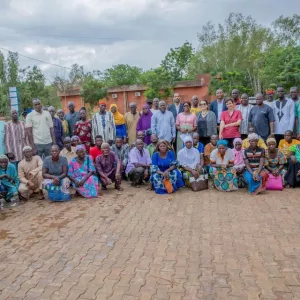Promoting Agrobiodiversity in the Sahel: Discover SUSTLIVES Project
Over the past three years, the Alliance of Bioversity International and CIAT has been working across the Sahel region to design a regional intervention across Burkina Faso and Niger, to holistically improve to human livelihoods and the surrounding environment. Agrobiodiversity is at the heart of this effort: the project promotes indigenous and climate-resilient crops, developing value chains that provide incomes

Promoting Agrobiodiversity in the Sahel: Discover SUSTLIVES Project
Over the past three years, the Alliance of Bioversity International and CIAT has been working across the Sahel region to design a regional intervention across Burkina Faso and Niger, to holistically improve to human livelihoods and the surrounding environment. Agrobiodiversity is at the heart of this effort: the project promotes indigenous and climate-resilient crops, developing value chains that provide incomes to women and young people. This work is funded by the European Union and implemented in partnership with the Italian Agency for Development Cooperation.
To reach the project’s objectives, the Alliance is contributing its expertise in the following areas:
Identifying neglected and underutilized species (NUS) with economic potential
whose reincorporation could contribute to environmental protection, climate change adaptation, social equity, and nutrition for local communities
Priority NUS are selected through consultation with local actors, combined with scientific research on the suggested varieties. Initially, an extensive list of NUS was proposed and ranked based on selection criteria such as their climate resilience, nutritional value, potential for value chain development, and role in increasing gender equality. An online survey has been developed and shared with local and international experts, and the results have been compared with outcomes from consultations carried out in both countries’ capital cities with stakeholders ranging from farmers’ organizations, government ministries, universities, and private-sector actors. By integrating qualitative insights, quantitative data, and involving stakeholders through participatory methods, the project designers could get a holistic understanding of the ecological and socio-economic value of the identified NUS. This inclusive approach strengthened the selection process, and created a sense of community engagement and ownership.
Mapping and Community Engagement: Custodian Farmers and Crop Heritage
Active community engagement is a cornerstone of SUSTLIVES, working with 10 villages near Niamey (Niger), and 11 villages near Ouagadougou (Burkina Faso). Through extensive mapping, the project identified custodian farmers – individuals who maintain valuable traditional knowledge about local crops and ecosystems – engaging 33 custodians in Niger, and 90 in Burkina Faso. By involving these guardians of local knowledge, SUSTLIVES taps into a wealth of wisdom that has been passed down through generations, allowing the project’s efforts to be rooted in local expertise.
Data Collection and Analysis: Illuminating the Path Forward
To support informed decision-making, SUSTLIVES puts a strong emphasis on data collection. By gathering and analyzing socio-economic and agro-environmental data, the project gains insights that guide its interventions. This data-driven approach enables precise targeting of challenges, and facilitates the development of solutions that consider the unique context of each region. The Alliance has already produced a series of research outputs, as well as materials for communities to use, including regionally adapted seasonal calendars, which identify seasonal gaps in nutrition, providing guidance on how to address malnutrition through seasonal adaptations.

